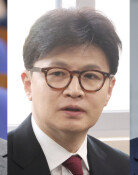Degradation via history books
Degradation via history books
Posted October. 25, 2011 03:13,
Those who set history textbook standards under the National Institute of Korean History in South Korea confirmed their final version of the standards for middle school textbooks to be used from 2013. The standards include removing items that could undermine the identity of the Republic of (South) Korea. A good example is excluding the phrases the only and on the Korean Peninsula out of the sentence, It should be noted that the Republic of (South) Korea is the only legitimate government on the Korean Peninsula. Under the standard, The Republic of Korea is the only legitimate government on the Korean Peninsula cannot be described in middle school history textbooks.
The legitimacy of South Koreas general elections in July 1948 was internationally recognized under U.N. supervision. North Korea, however, rejected the entry of U.N. supervisors. It was natural for the world body to recognize South Korea as the only legitimate government on the peninsula. When the North invaded the South on June 25, 1950, the U.N. sent its troops to the South because it recognized South Korea as the sole legitimate government on the peninsula.
Despite these facts, those responsible for setting history textbook standards nonsensically claim that the government of the Republic of Korea is the legitimate government in South Korea, but not the only legitimate government on the peninsula. They cite as evidence that the republic was a government elected by voters residing in a certain region in U.N. Resolution No. 195 passed in December 1948. This, however, ignores the context of the resolution and denies historical truth. The standard makers seem to degrade the Republic of Korea and define North Korea as another legitimate government. The textbook standards in the section of challenges in a free democracy include the problems of the dictatorial regime and exclude the threat of North Korea, which raises a fairness issue. If the Rhee Syngman and Park Chung-hee administrations are defined as dictatorships, the achievements of Rhee, who helped to found the republic, and Park, who contributed to South Koreas economic development, can be excluded or cannot be reasonably assessed.
The standard makers comprise six history professors and teachers. The new standards, which were made after harsh public criticism over left-leaning history textbooks, appear to be even more biased instead of objective. The fundamental cause lies in historians who have traditionally been pro-North Korea and obsessed with left-leaning nationalism and unconditional reunification. Critics say historians remain the same because they are trapped in their own logic. They should cooperate in making history textbooks that respect the identity and legitimacy of the Republic of Korea.







